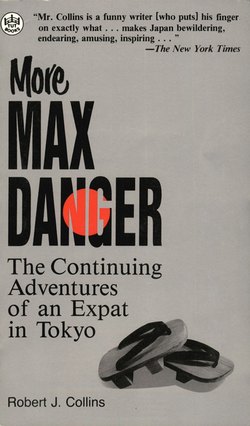Читать книгу More Max Danger - Robert J . Collins - Страница 8
На сайте Литреса книга снята с продажи.
ОглавлениеINTRODUCTION
MY GRANDMOTHER, a wise and wondrous woman, had a handle on Japan. As a college student in the late nineteenth century, she studied all that was known in the West about the Land of the Rising Sun. She understood what there was to understand.
"It's a nation of smallish people," she'd say, "who do clever things with their hands."
My wife's grandmother, a native of old Tokyo, had a handle on non-Japanese. As one of the first of the diplomatic wives to go abroad, she observed the West through the filter of ambassadorial politeness and restraint. She understood what there was to understand.
"They're all big people," she'd say, "who believe their opinions are facts."
As someone involved with the legacy of both these noble ladies, I have long felt a responsibility to set the record straight. I mean, how could old-timers like that—people born years before our parents—have anything but naive and ill-formed opinions about subjects as complex as Japan and the West? And without, as far as I know, the advantage of television.
Max Danger has been inserted in the midst of the commercial and economic empire of today's Japan. As a Westerner, he is not just observing Japan, he is living in and with it. He is also exposing himself to the Japanese, who in turn have the opportunity to relate at various levels with him.
The stories—some true, some almost true, and some that should be true—chronicle the adventures of people on both sides of the issue. It's a random bag, so not every chance encounter, misunderstanding, thrill, or disappointment develops the dramatic potential for a full-blown story.
For example, this morning the superintendent of our building did something he's been doing every day for ninety-one straight days. He rang the doorbell at 7:30 AM and asked if I wanted him to bring the morning newspaper up from downstairs. I did what I've been doing for ninety-one straight days and said "yes." He went away. The fact that he has never returned with the newspaper—not once in ninety-one straight days—probably has something to do with my misunderstanding of certain elements in this ritual, but whatever the story is, there is not enough for Max to sink his teeth into.
The stories do reflect, by design, the type of experiences that relative newcomers to Japan have. (Old-timers have learned to mask their reactions to the mysteries of Dai Nippon, and scholars claim to have "understood things all along.") And the stories present typical Japanese reactions to the often confounding experience of trying to figure out what's going on between the ears of the unpredictable Westerner. All this, in theory, leads to enhanced understanding.
Now, what about the grandmothers? A lot of enhanced understanding has gone on since their days. Max, alone, has been involved in eighty adventures. (Ask for Volume I in your favorite bookstore—my daughter will soon be off to an expensive college.) Is the enhancement sufficiently fine-tuned to challenge the perceptions of old ladies who closed their days writing haiku poetry and playing bridge? Do we know what they saw incompletely or incorrectly? Has naïveté been swept away?
No. And speaking as a Westerner, that's a fact. (But the stories are fun.)
ROBERT J. COLLINS
Tokyo
